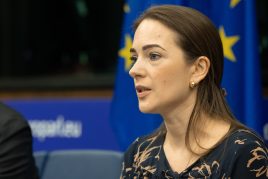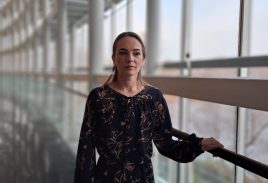
The Ukrainian Centre for Civil Liberties has been recording and documenting acts of violence against civilians and crimes committed by the Russian army since 2014. The Centre collected testimonies regarding over 27,000 war crimes prior to the war, making it almost impossible to retrace the facts in real time. “Personal stories have thus become numbers”, said Oleksandra Matviychuk, the human rights lawyer who heads the NGO, awarded the 2022 Nobel Peace Prize together with her Russian and Belarusian counterparts on December 10th in Oslo. SIR met her in Strasbourg, where she arrived along with other Ukrainian representatives of civil society and elected leaders, to be awarded the 2022 Sakharov Prize for Freedom of Thought, which the European Parliament chose to confer to the “courageous people of Ukraine”. According to Matviychuk, “Putin is not afraid of NATO, but of freedom. With the invasion of Ukraine he is trying to prove that democracy and human rights failed to protect people from the war.”
 “My idea and my intention is to create a system that will ensure justice for all the victims of oppression. A comprehensive strategy for attaining justice through a dedicated international court on aggression is necessary”, Matviychuk explained. The Ukrainian government “favours this project which we endorse, because unfortunately at the moment there are no other international bodies entitled to deal with these crimes. Once this tribunal is set up, with the support of the UN, the European Council or the EU, it will take months before evidence is collected, before the facts are recorded in juridical language. In fact, while it’s evident that Russian troops are on Ukrainian territory, we must become the voice of the victims, and document Russia’s intention to perpetrate a genocide against Ukraine.” A genocide “does not require killing an entire people, it can be committed by eroding the Ukrainian identity, which is what is happening in the occupied territories. That’s why an international model is needed, whereby international investigators and judges cooperate with their national counterparts in a Court that will not be based in The Hague or Geneva or Berlin, but in Ukraine. It has to be independent, but above all it should become operative as of today, so as to determine who is responsible for what is happening.”
“My idea and my intention is to create a system that will ensure justice for all the victims of oppression. A comprehensive strategy for attaining justice through a dedicated international court on aggression is necessary”, Matviychuk explained. The Ukrainian government “favours this project which we endorse, because unfortunately at the moment there are no other international bodies entitled to deal with these crimes. Once this tribunal is set up, with the support of the UN, the European Council or the EU, it will take months before evidence is collected, before the facts are recorded in juridical language. In fact, while it’s evident that Russian troops are on Ukrainian territory, we must become the voice of the victims, and document Russia’s intention to perpetrate a genocide against Ukraine.” A genocide “does not require killing an entire people, it can be committed by eroding the Ukrainian identity, which is what is happening in the occupied territories. That’s why an international model is needed, whereby international investigators and judges cooperate with their national counterparts in a Court that will not be based in The Hague or Geneva or Berlin, but in Ukraine. It has to be independent, but above all it should become operative as of today, so as to determine who is responsible for what is happening.”
Why is this project so important to you?
Based on my experience I realized that what people need is not limited to putting their lives back together. They need to restore their truths, the things they believe in, including the fact that justice is possible, which is not just about putting people behind bars:
war turned people into numbers, and only justice can restore people’s names and dignity.
When carrying out an investigation, there are no distinctions, whoever you are, investigations are the same for all, the purpose is to establish the facts, who committed the crime, and the degree of cruelty. So now the principle enshrined in all constitutions and conventions, namely that all lives matter, must be put into practice.
 Why do you keep saying that we have “no more time left”?
Why do you keep saying that we have “no more time left”?
I’m afraid that Russia’s example might inspire other authoritarian regimes. The belief that we live in a system of peace and security is delusional. Even the UN’s assurances could not stop Russia, and others could plan similar attempts to impose their own rules of the game on the rest of the world. That is why in my Nobel Prize acceptance speech I mentioned our historic responsibility in the creation of a new international structure aimed at ensuring peace and security for all peoples, not just for Ukraine. For us this is already too late. We must guarantee security and respect of human rights for all citizens, regardless of the country they live in.
Did you feel you were being listened to and understood when you delivered your speech in Oslo on December 10?
There was a very special atmosphere in Oslo. However, politicians are the ones who need to listen, and this will depend on how many people we manage to involve in this global appeal for justice. That is why in my speech I also referred to movements, horizontal cooperation, solidarity, joint initiatives.
Speaking in Oslo, my Russian colleague Jan Rachinsky said that Europe has to decide between temporary discomfort today or catastrophe tomorrow.
In order to defeat Putin and Russia’s attempt to restore its empire, other nations need to step out of their comfort zone.
What is your source of inspiration? Where do you find the strength to carry on?
Ordinary people are my source of inspiration, those who remained despite the war and reached out to help other people survive, joined forces to distribute humanitarian aid, to help people flee bombed-out cities. People like the husband of a friend of mine who died while helping other people escape, his body ripped apart by an explosion. When you hear these stories you no longer have a right to stop, to complain. We have a huge historical responsibility. I don’t want my children to grow up with that kind of experience. We have to end it.
Did you expect to win the Nobel Prize?
The Nobel Prize is for extraordinary people, we activists are not celebrities, nobody really cares about us. However, I feel that I have a responsibility now, because the prize gives us a unique opportunity to be heard. Weapons are words now, as the voices of people like ourselves were not listened to for years, for decades. Russia’s free voices remained unheard and Western democracies just continued doing business with Russia, as if nothing had happened. They shook Putin’s hands, they built the Nord-Stream pipelines. There is a very important lesson to be learned: if prosperity takes precedence over human rights, there will be neither security nor financial benefits.
How distant is peace?
I cannot foresee the future, but I can fight for a better future. In this war, we all know what we are fighting for: victory means not just ousting Russian troops and retaking our land, but achieving democratic transformation and fulfilling people’s dream, which has become manifest in the dignity revolution.
We are paying a very high price for our commitment to democracy. Our victory will be not only for Ukraine but for the entire region.
Yet, what is unclear to me is why, while we are fighting for the whole of Europe, we are not receiving weapons. We are not asking that people join us in the fight, we can do it ourselves, but at least give us the weapons.









